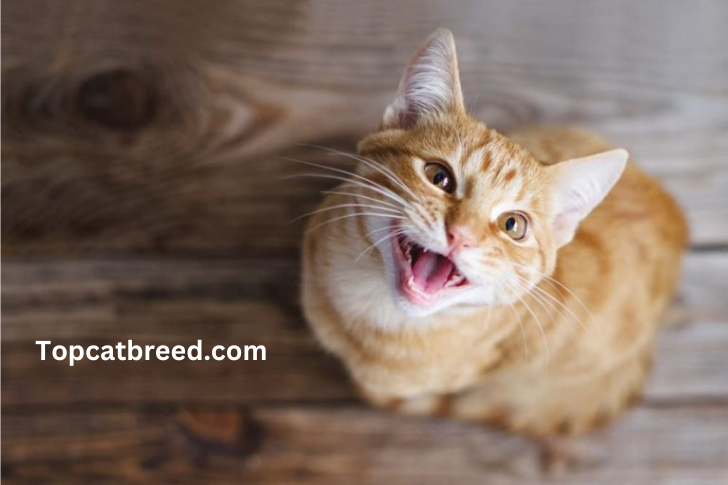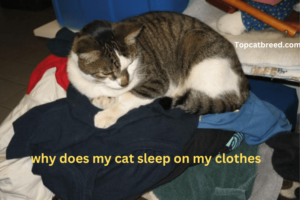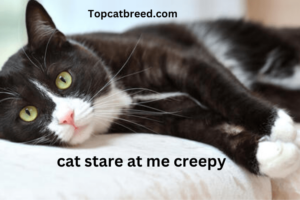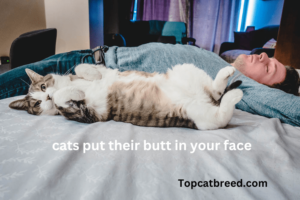Cat owners often find their furry friends meowing when they pet them. This might make you wonder, the delightful sounds of a cat’s meow are familiar to anyone who has had the pleasure of sharing their life with a feline friend. However, sometimes this meow may puzzle cat owners when it occurs in response to physical affection. “Why does my cat meow when I touch her?” is a common question that can stir both curiosity and concern.
Welcome to the intriguing world of feline communication and touch sensitivity. This article will unravel the complexities of why your cat vocalizes when touched, exploring not only the emotional aspects but also potential medical factors. By comprehending the reasons behind your cat’s vocalizations, you’ll glean valuable insights into her needs, fostering a stronger bond between you and your cherished pet. Whether it’s a form of communication, a sensory response, or an indicator of an underlying issue, this exploration aims to shed light on the charming and often enigmatic behavior of why does my cat meow when I touch her.
Understanding Feline Communication through Meowing
The Language of Meows: Decoding Your Cat’s Verbal Signals
Cats are renowned for their vocalizations, and meowing is a significant part of their communication. When your cat meows, she’s conveying a specific message. Understanding what these meows mean can deepen your connection with your feline friend.
Happiness Meows
Many cats’ meow as a sign of contentment and pleasure, especially when they’re being petted or held. It’s their way of expressing joy and appreciation for your attention. You might notice your cat purring in harmony with these happy meows, creating a symphony of satisfaction.
Attention-Seeking Meows
Cats may meow to get your attention. When you pick up your cat, she might meow because she wants more affection or playtime. These meows often come with enthusiastic body language, like rubbing against you or kneading their paws on your lap.
Annoyance or Overstimulation Meows
Some cat’s meow when you pick them up because they’ve had enough or feel slightly irritated .Pay attention to her body language; if she becomes tense or her tail starts to flick; it’s a sign that she might be getting annoyed. These meows are more like gentle warnings to let her down or give her some space.
Fear or Discomfort Meows
A cat’s meowing when picked up could be a sign of fear or discomfort. When cats are anxious or in pain, they may vocalize to express their distress and communicate that being held is not preferred. Paying attention to these meows is crucial, as they could be indicative of an underlying issue that requires addressing.
What is Meowing, and What Does It Mean?
Meowing serves as a communication tool for domestic cats to interact with their human companions. It’s a versatile form of communication, with each meow conveying different emotions and needs.
Expressing Emotions
Cats use meowing to convey a wide range of emotions, from happiness and excitement to frustration and anxiety. Understanding the emotional context of the meow is essential to comprehend your cat’s feelings.
Seeking Attention
One common reason for meowing is seeking attention. Cats love being the center of your world, and meowing is their way of saying, “Pay attention to me!” They may follow you around the house, meowing to initiate interaction.
Initiating Interaction
Meowing can serve as an invitation to interact. When your cat meows and then looks at you, it’s often an invitation to play, cuddle, or engage in some form of bonding activity.
Expressing Discomfort
Some meows may indicate that your cat is uncomfortable or in pain. These meows are more urgent and distressed in tone. It’s crucial to investigate the source of discomfort if you notice these types of meows.
Is It Normal for My Cat to Meow When I Pick Her Up?
It’s relatively normal for a cat to meow when you pick her up, although the reasons behind it can vary. Some cat’s meow to express their happiness and enjoyment of being held, while others may do so to signal a desire for more interaction or play.
Expressing Joy
When your cat meows while being held, it’s often a sign of contentment and joy. They enjoy the closeness and attention you provide, and meowing is their way of expressing gratitude.
Desiring More Interaction
Some cat’s meow as a way of saying, “Don’t stop now!” They may want more petting, play, or affection, and meowing is their means of requesting additional attention.
Respecting Boundaries
While many cats enjoy being held, some have specific comfort boundaries. If your cat meows but appears tense or uncomfortable, it’s essential to respect her limits and return her to a comfortable spot. Not all cats have the same preferences for being held, so being attentive to your cat’s signals is key.
Expressing Discomfort
In some instances, a cat may meow when picked up to communicate discomfort or pain. These meows are more intense and distressing and should prompt you to check for any physical issues or injuries.
What Does Your Cat’s Meowing Indicate?
Understanding the Language of Feline Meows .Cats have a unique way of communicating through meowing, and each meow has its own significance. By decoding your cat’s vocal signals, you can better respond to their needs and strengthen your bond.
Normal Communication
Cats communicate mostly through meowing. They may meow to say hello, ask for attention, or express their feelings. Recognizing the context and tone of the meow is crucial in understanding what your cat is trying to convey.
Expressing Desires
Cats often meow to get what they want. Whether it’s food, playtime, or access to a particular spot, meowing serves as a request for fulfilling their desires. Paying attention to your cat’s meows can help you meet their needs effectively.
Sign of Distress
Sometimes, meowing can indicate distress or discomfort. If your cat’s meow sounds unusual or persistent, it’s essential to investigate the cause. It could be due to pain, illness, or anxiety. Understanding the specific cues of distress can help you address the issue promptly and ensure your cat’s well-being.
When I pet my cat, why does she squeak?
Understanding the Quirky Noises Your Cat Makes .Cats can make a variety of noises, including squeaks, while being petted. These sounds can have various meanings, depending on your cat’s personality and feelings.
Contentment Squeaks: Many cats emit cute, high-pitched squeaks when they’re being petted, particularly in their favorite spots. These squeaks typically indicate pleasure and contentment. Your cat may be so happy that she can’t help but make a little noise.
Overstimulation Squeaks: Some cats may squeak when they’re over stimulated. If your cat becomes too excited or sensitive to touch, she might squeak to signal that she needs a break. It’s essential to recognize these cues and give your cat some space when she squeaks in this context.
Vocal Personality: Just like humans, cats have unique vocal personalities. Some cats are naturally more vocal and prone to making sounds, including squeaks, during petting. This might be their way of expressing their enjoyment and engaging with you.
ALSO RAED. Why does my cat meow after eating?-10 reasons for weird
Medical Reasons for Excessive Meowing
When Meowing Signals an Underlying Health Issue . Excessive meowing can sometimes be a sign of an underlying medical problem. It’s crucial to pay attention to changes in your cat’s meowing patterns and consult a veterinarian if you suspect a health issue.
Pain and Discomfort
Cats may meow more when they’re in pain or discomfort. If your cat has an injury, dental issue, or an underlying medical condition, she may meow to express her distress. A vet can identify and address the source of pain. This is crucial to ensuring your cat’s comfort and well-being.
Hyperthyroidism
Hyperthyroidism, often found in older cats, can result in increased vocalization. If your cat is meowing excessively and experiencing weight loss, it’s crucial to consult a veterinarian for a thyroid level check. Effectively managing hyperthyroidism can make a significant positive impact on your cat’s overall quality of life.
Cognitive Dysfunction
Senior cats may experience cognitive dysfunction, leading to increased meowing. It’s a good idea to consult a vet if you notice changes in your older cat’s behavior. Your veterinarian can recommend strategies and treatments to support your senior cat’s cognitive health.
Final Thoughts
As a conscientious cat owner, recognizing and responding to your cat’s meows and squeaks is a crucial aspect of responsible and caring pet ownership. Attentiveness to their vocal signals allows you to effectively address their needs, provide comfort, and ensure their overall well-being. Whether it’s a contentment squeak during petting or an unusual meow indicating distress, your cat’s communication is a valuable tool for maintaining a strong bond.
Additionally, recognizing when excessive meowing may indicate a medical issue is crucial for prompt treatment and the continued health and happiness of your feline companion. Ultimately, by listening to your cat’s voice, you strengthen your connection and provide the best possible care.
FAQS
1-Why does my cat meow excessively during petting?
Excessive meowing during petting can stem from either overstimulation or pure enjoyment, depending on your cat’s individual preferences.
2-Is it normal for my cat to squeak when I touch her?
Yes, some cats make squeaking sounds when touched, indicating contentment.
3-What should I do if my cat’s meowing during petting turns into hissing or aggression?
Recognize your cat’s boundaries and provide space. Some cats may need shorter or gentler petting sessions.
4-Can medical issues cause excessive meowing during petting?
Yes, medical problems can lead to changes in behavior. Consult a vet if you notice unusual meowing during petting.
5-Are some cat breeds more prone to meowing during petting?
Certain breeds, like Siamese cats, tend to be more vocal, but individual personality also influences meowing behavior.
conclusion
In conclusion, understanding Why does my cat meow when I touch her is an essential aspect of being a responsible and loving cat owner. These vocal cues provide valuable insights into your feline companion’s feelings and preferences during petting. Whether it’s a squeak of pleasure or a signal of overstimulation, understanding and honoring your cat’s boundaries are crucial for fostering a strong and harmonious bond. Furthermore, staying vigilant for any unusual shifts in meowing behavior during petting and promptly seeking veterinary care when necessary contribute to your cat’s ongoing health and happiness.




